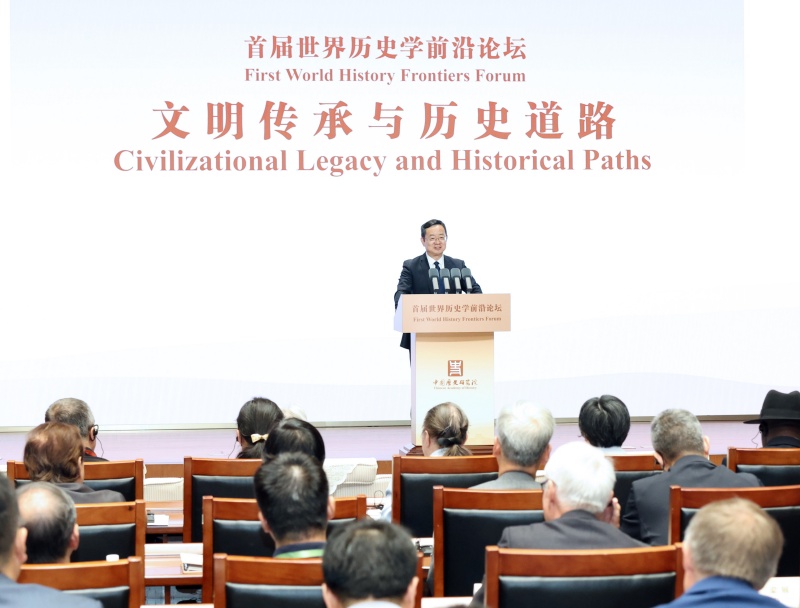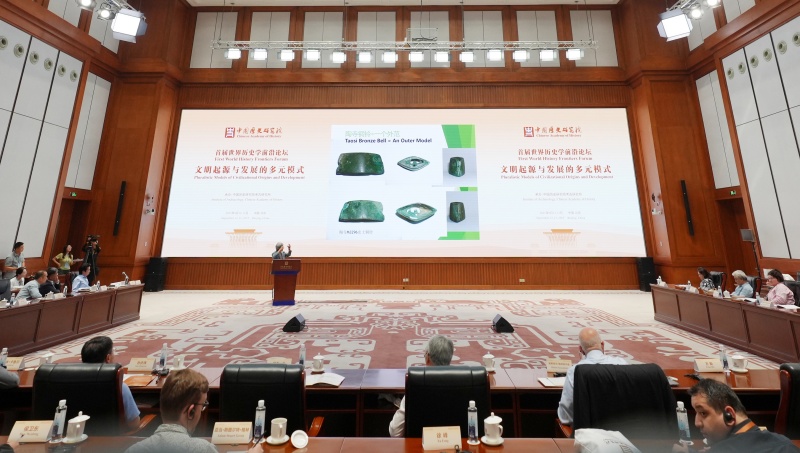


Gao Xiang, president of the Chinese Academy of Social Sciences (CASS) and president of the Chinese Academy of History (CAH) under CASS, addresses the opening ceremony of the forum. Photo: Wang Zhou/CSST

A scene of the parallel forum on “Pluralistic Models of Civilization: Origins and Development” Photo: COURTESY OF CAH
On Sept. 12–13, the First World History Frontiers Forum was held in Beijing. With the theme “Civilizational Legacy and Historical Paths,” the event brought together nearly 300 experts and scholars from China, the United States, Russia, France, Germany, Egypt, Japan, as well as the Hong Kong Special Administrative Region (SAR), the Macao SAR, and the Taiwan region. The conference featured six parallel forums under the themes “Pluralistic Models of Civilization: Origins and Development,” “The Evolution of Civilizations and the Formation of Historical Paths,” “Modern China and the World in the Context of Intercivilizational Encounters,” “Civilizational Diversity and Different Historical Paths,” “Intercivilizational Exchange and Mutual Learning: Historical Process and Contemporary Significance,” and “Cultural Integration and Dialogue for a Global Community of Shared Future,” alongside a youth forum themed “Historical Trajectories and the Future of Human Civilization.”
Intercivilizational exchange critical
Addressing the opening ceremony, Gao Xiang, president of the Chinese Academy of Social Sciences (CASS) and president of the Chinese Academy of History (CAH) under CASS, noted that the history and culture of a country or nation, particularly core civilizational elements, always epitomize its values and historical character, underpinning its chosen path of development. Every civilization is irreplaceable in human history, he said, and the values and way of life of each country and people deserve respect. Each has the right to choose a development path suited to its national realities.
Today, the Cold War mentality, hegemonism, and protectionism still cast a long shadow, as new threats and challenges continue to emerge, Gao observed. The world has entered a new period of turbulence and transformation, bringing global governance to a new crossroads. He underscored the imperative for human society to draw wisdom from history, urging historians to step up research on the evolution of human civilization, analyze the past and present of different civilizations with scientific rigor, and uncover the inherent logic of their progression.
History is deeply intertwined with the present and the future, elaborated Rebecca Lemos Igreja, secretary-general of the Latin American Faculty of Social Sciences, who highlighted the importance of telling historical stories well so countries can jointly address future challenges. In her view, world history should be documented in a more pluralistic way, ensuring that marginalized historical and cultural narratives are neither ignored nor forgotten—something that requires collective efforts to engage in cross-cultural dialogue.
Kostas Gouliamos, a member of the European Academy of Sciences and Arts and recipient of the Chinese Government Friendship Award, described civilization as a catalyst for human progress that has always advanced through dialogue and exchange. Given that humanity is more interconnected than ever before, he called for greater attention to how civilizations have influenced one another, while promoting peace, harmony, and cooperation with respect for civilizational diversity. Additionally, he stressed the need to integrate research methods from disciplines such as history, archaeology, anthropology, and sociology, thereby deepening studies of humanity’s shared heritage and promoting the construction of a more inclusive global narrative.
Featuring comparative analysis
Comparative analysis of different civilizations was a salient feature of the forum. Examining similarities and differences between the civilizations of Guatemala and Mexico and Chinese civilization, Inomata Takeshi, a professor from the University of Arizona in the United States, found striking parallels in rituals and knowledge transmission. In both Chinese and Maya civilizations, he observed, writing was not simply a tool but closely bound to ritual, which itself was intertwined with astronomical and calendrical knowledge.
Inomata’s archaeological research reveals that many instances of large-scale human collaboration in early civilizations challenge the outdated notion that civilizational development inevitably accompanies inequality. He argued that modern civilization must place greater emphasis on the potential for collaboration, and that civilizational interaction and knowledge sharing are crucial foundations for fostering such cooperation.
François Gipouloux, emeritus research director of the National Centre for Scientific Research of France, told CSST that his study of Asia was deeply inspired by the research approach of renowned French historian Fernand Braudel to the Mediterranean. In his view, the Chinese cities of Guangzhou and Macao, along with certain Japanese port cities, are far more than mere historical-geographical concepts—they represent deeply interconnected institutional models. These cities not only engage in close economic and trade exchanges with one another but have also maintained stronger ties with their respective inland regions than ever before. This cross-paradigm analytical framework, he suggested, has opened new pathways for the study of global civilizations.
Miyamoto Kazuo, a professor and former vice president of Kyushu University in Japan, has long been dedicated to researching the origins of Chinese and East Asian civilizations. His participation in the forum rewarded him with fresh insights: By learning about practices in other regions aimed at improving livelihoods and praying for wellbeing, he was able to probe their underlying logic and conduct comparative analyses with East Asia, helping him resolve questions in his research. He believes that the origins of civilization in each region hold unique value, and that interaction and exchange between civilizations remain key to uncovering it.
The forum was hosted by the CAH and organized by CASS’s Institute of Archaeology, Institute of Ancient History, Institute of Modern History, Institute of World History, Institute of Chinese Borderland Studies, Institute of Historical Theory, and the University of Chinese Academy of Social Sciences.